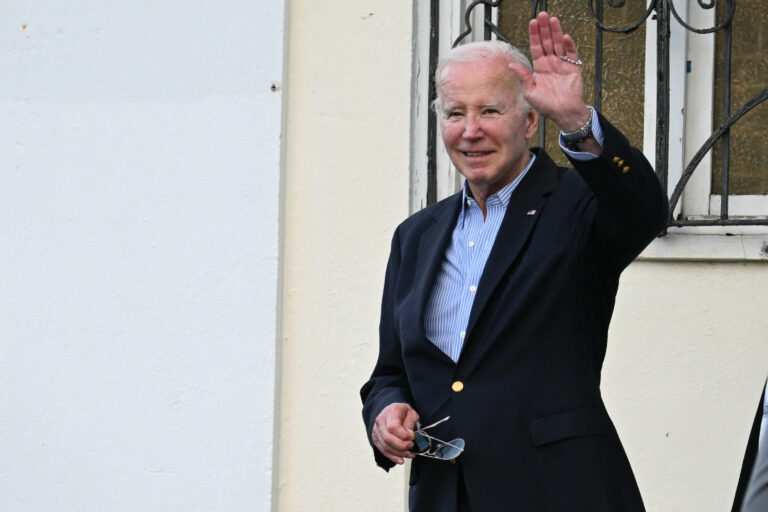
The state’s board of elections unanimously voted Tuesday not to add President Joe Biden’s challengers to North Carolina’s 2024 Democratic primary election ballot, with board members saying they would not exercise their discretionary authority to add candidates as these are “party issues.”
This decision goes in line with the state Democratic Party’s preference to have Biden as the sole option, which all but guarantees him a victory in this race and will give him the bulk of the state’s share of delegates, who then vote in the party’s national convention to nominate a candidate for the general election.
In December, the board unanimously approved names of candidates to go on ballots, based on the names sent by the parties. The state’s Democratic Party only submitted Biden as an option. Republicans listed former President Donald Trump, Florida Gov. Ron DeSantis, former South Carolina Gov. Nikki Haley and others. The Libertarian Party also listed a slew of candidates.
The decision to only have Biden on the ballot was contested by other Democratic candidates, including Minnesota congressman Dean Phillips and Marianne Williamson, a self-described spiritual thought leader and author, who also ran for president in 2020. In advance of Tuesday’s meeting of the board of elections, both candidates pointed to a state law that allows the board to include a presidential primary candidate that has been “generally advocated and recognized in the news media throughout the United States or in North Carolina,” unless the candidate opts out.
On Tuesday, Alan Hirsch, the Democratic chairman of the board of elections, said the board had received petitions to add three names to this year’s Democratic primary, including for Williamson, Phillips and Cenk Uygur. Another candidate had also filed a petition, but it was unclear for which primary. Hirsch also said the board had received a petition from Jill Stein to be added to the Green Party ballot, despite the Green Party not wishing to hold a primary.
Hirsch said while the board had the discretionary authority to add names, in his view, “these are party issues.”
“These are presidential preference primaries, whose purpose is to elect delegates to go to the national conventions,” he said.
There’s no formal petitioning process to be added to the presidential list submitted by the parties, but there is a state law that allows candidates to file with the board a petition signed by 10,000 registered party members for inclusion on the primary ballot, said Pat Gannon, a spokesman for the board.
The candidates discussed by the board took no formal action and all wrote emails or letters asking to be added, Gannon said in an email.
Kevin Lewis, a Republican board member, said that some of the candidates, including the Green Party candidate, are recognized in the news media but “these are party parameters and the party should have the right, I think, to nominate candidates of (its) choosing.”
Democrats vs. Biden’s challengers
Asked in late December about the choice to only include Biden and the candidate challenges, Tommy Mattocks, a Democratic Party spokesman, told The News & Observer in an email that, “In order to get on the ballot, you need to have donors in the state, and be actively campaigning in the state.”
“Neither of them have been here this cycle,” Mattocks said of Williamson and Phillips. “This is the standard that we have used in all previous cycles.”
After the board’s decision, Sydney Goldstein, Williamson’s spokesperson, said they were disappointed that the board “abdicated their authority to protect North Carolina voters from the North Carolina Democratic State Party attempts to circumvent democracy.”
“It is not the job of the State Board of Elections to protect incumbents. It is their job to oversee elections in a non-partisan manner,” she said in an email, adding that Williamson had “received extensive national news media coverage, is a member of the Democratic Party, and meets all the requirements for the Office of President as set forth in the United States Constitution. “
Trump’s challengers were added in 2020
All five members voted in favor of the motion to maintain the list of Democratic, Republican and Libertarian candidates voted on initially in December.
In 2020, the board decided differently, voting unanimously to allow two other Republican candidates to be added to the presidential primary ballot list, which until then only featured then-President Trump’s name.
During that 2020 board meeting, Bob Orr, a former N.C. Supreme Court justice who’s been one of Trump’s most prominent Republican critics in the state, spoke on behalf of the two Republican candidates seeking to be added, former Massachusetts Gov. Bill Weld and former U.S. Rep. Joe Walsh. Nobody spoke on behalf of more obscure candidates also seeking addition.
Then-N.C. Republican Party executive director Jonathan Sink spoke against adding candidates but was ultimately unsuccessful, The N&O reported at the time.
While the board has finalized the parties’ primary candidates this year, things could still change, with Trump’s candidacy being challenged in state courts. Also pending is whether the Green Party and the No Labels Party, a new centrist political party backed by former Republican Gov. Pat McCrory, will put forth a presidential candidate — just not through the primary process.
The primary election is March 5.
___
© 2024 McClatchy Washington Bureau
Distributed by Tribune Content Agency, LLC.
0 comments :
Post a Comment